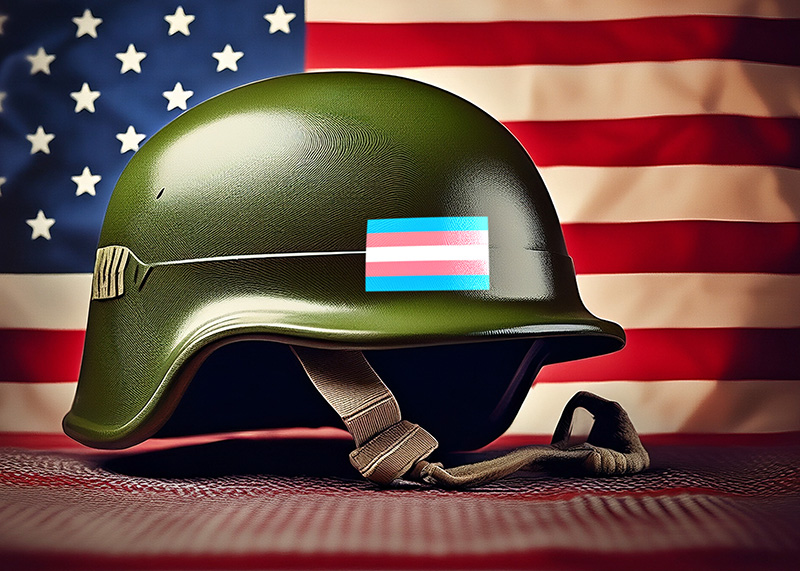Trans adults four times more likely to attempt suicide than straight cis peers
Trans Americans are also more likely to be treated with less respect, to receive poorer service, and to self-harm than cis peers

A new report has found that transgender adults are four times more likely than their cisgender heterosexual peers to attempt suicide.
More than four in ten (42%) transgender adults in America have made at least one suicide attempt, compared with only 8% of cis hetero adults, according to a new study from the Center for American Progress.
A similar number (42%) of transgender individuals have reported attempting suicide specifically to cope with discrimination related to their gender identity.
Transgender people are also significantly more likely to contemplate suicide (81% vs. 30%) and to engage in non-suicidal self-injury (56% vs. 9%) than their cisgender heterosexual peers.
“Regular harassment and discrimination contribute to high rates of stress and — combined with adverse social, political, and economic risk factors — make transgender individuals significantly more likely to experience poor health outcomes,” CAP noted. “Structural, institutional, and individual barriers in access to care, along with a lack of cultural competency from many health care providers, contribute to the large disparities in health between transgender and cisgender populations.”
Among those health disparities, CAP found that transgender people are twice as likely as their cis peers to be told they have a depressive disorder, while also reporting more than twice as many days with poor mental health.
Related: Half of all transgender people have experienced mistreatment at the hands of a medical provider
CAP also noted that the stigma, prejudice, and discrimination experienced by transgender people can contribute to mental health problems, with four in five transgender adults reporting being treated with less courtesy or respect than their cis hetero peers.
Trans adults were more likely to often feel they were treated with less respect, received poorer service in restaurants or stores, treated as if they are not smart, that people acted as if they were afraid of them, and to be called names, insulted, threatened, or harassed.
More than a quarter of trans adults (26%) often felt that other people acted as if they better than them, compared with just 2% of cisgender heterosexual people.
“Discrimination, stigma, and violence, along with other social, political, and economic factors, significantly affect the physical, mental, and behavioral health of transgender adults,” the study’s authors wrote. “Research demonstrates that, compared with the general population, transgender people suffer from more chronic health conditions and experience higher rates of health problems related to HIV/AIDS, substance use, mental illness, and sexual and physical violence, as well as higher prevalence and earlier onset of disabilities that can also lead to health issues.
“In addition to poorer health outcomes, transgender people also encounter unique challenges and inequalities in their ability to access health insurance and adequate care,” they continued. “The public health and economic crises spurred by the COVID-19 pandemic have only exacerbated existing disparities and barriers to care for transgender people, especially transgender people of color.”
The authors noted that robust laws can protect transgender people against discrimination, they “must be paired with enforcement mechanisms and in-practice policies that are affirming, inclusive, and culturally competent.”
“Adopting both nondiscrimination laws and inclusive policies will be critical for improving health outcomes and the daily lives of the estimated 1.4 million adults identifying as transgender in the United States,” they wrote.
CAP highlighted the dozens of anti-trans bills and laws being introduced and passed across the U.S. in Republican-controlled states.
“Given the current slate of discriminatory and harmful state-level bills that seek to strip transgender youth and adults of their rights and access to health care, fully implementing these protections is vital and will have life-saving consequences,” authors wrote. “The current administration’s executive actions to combat discrimination…and to advance support for underserved communities offer opportunities to facilitate these changes. The time for the federal agencies and health providers to act is now.”
Read More:
Indiana school district may ban “controversial” Pride flags after parent complains
Mother sues TSA for trying to subject her transgender daughter to a strip-search at the airport
Tired of COVID-19? Get vaccinated and wear a mask, gay doctors urge
Support Metro Weekly’s Journalism
These are challenging times for news organizations. And yet it’s crucial we stay active and provide vital resources and information to both our local readers and the world. So won’t you please take a moment and consider supporting Metro Weekly with a membership? For as little as $5 a month, you can help ensure Metro Weekly magazine and MetroWeekly.com remain free, viable resources as we provide the best, most diverse, culturally-resonant LGBTQ coverage in both the D.C. region and around the world. Memberships come with exclusive perks and discounts, your own personal digital delivery of each week’s magazine (and an archive), access to our Member's Lounge when it launches this fall, and exclusive members-only items like Metro Weekly Membership Mugs and Tote Bags! Check out all our membership levels here and please join us today!
























You must be logged in to post a comment.